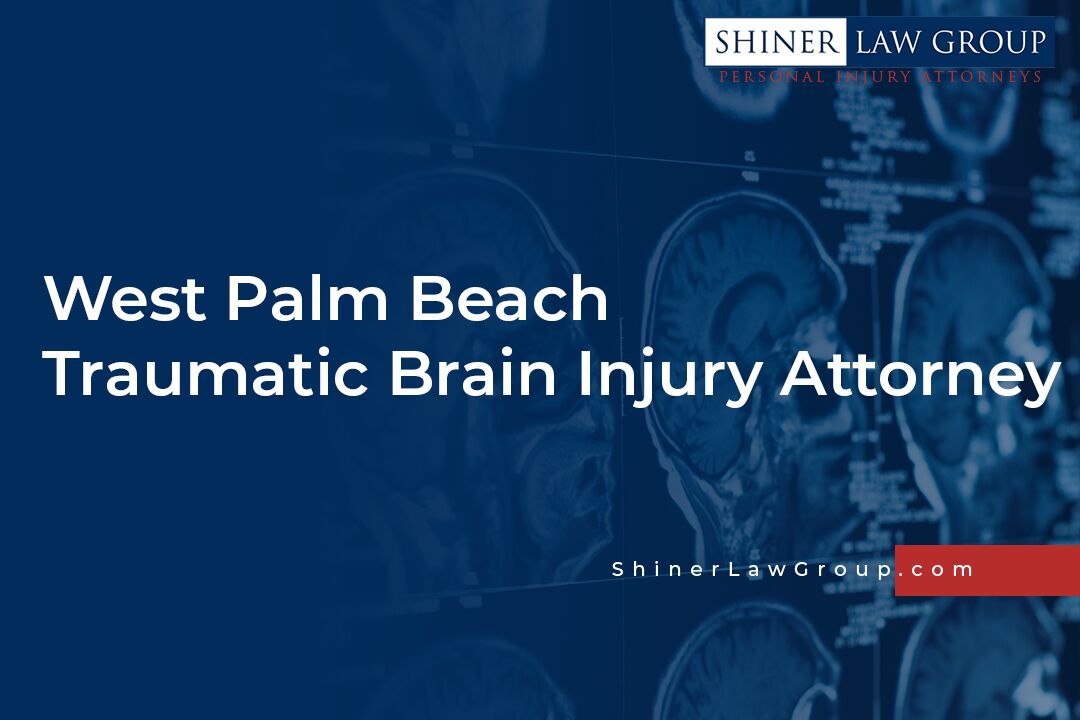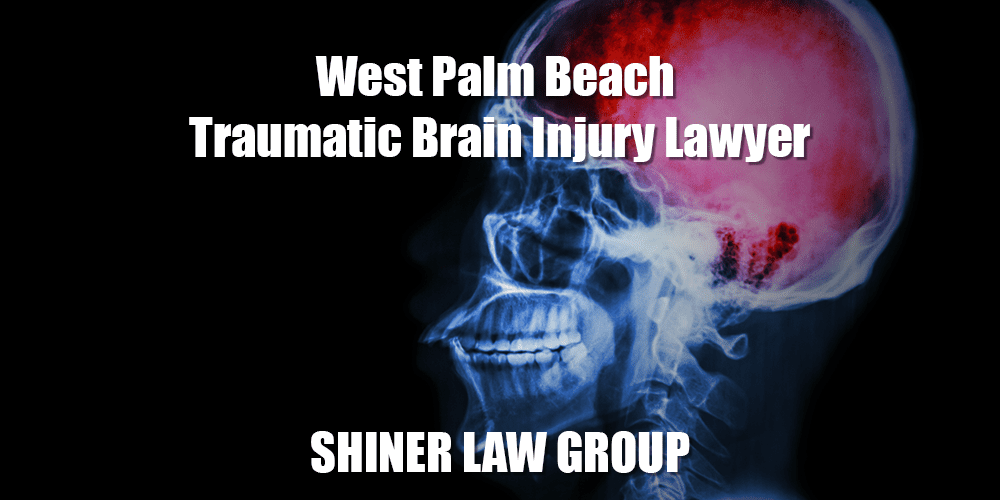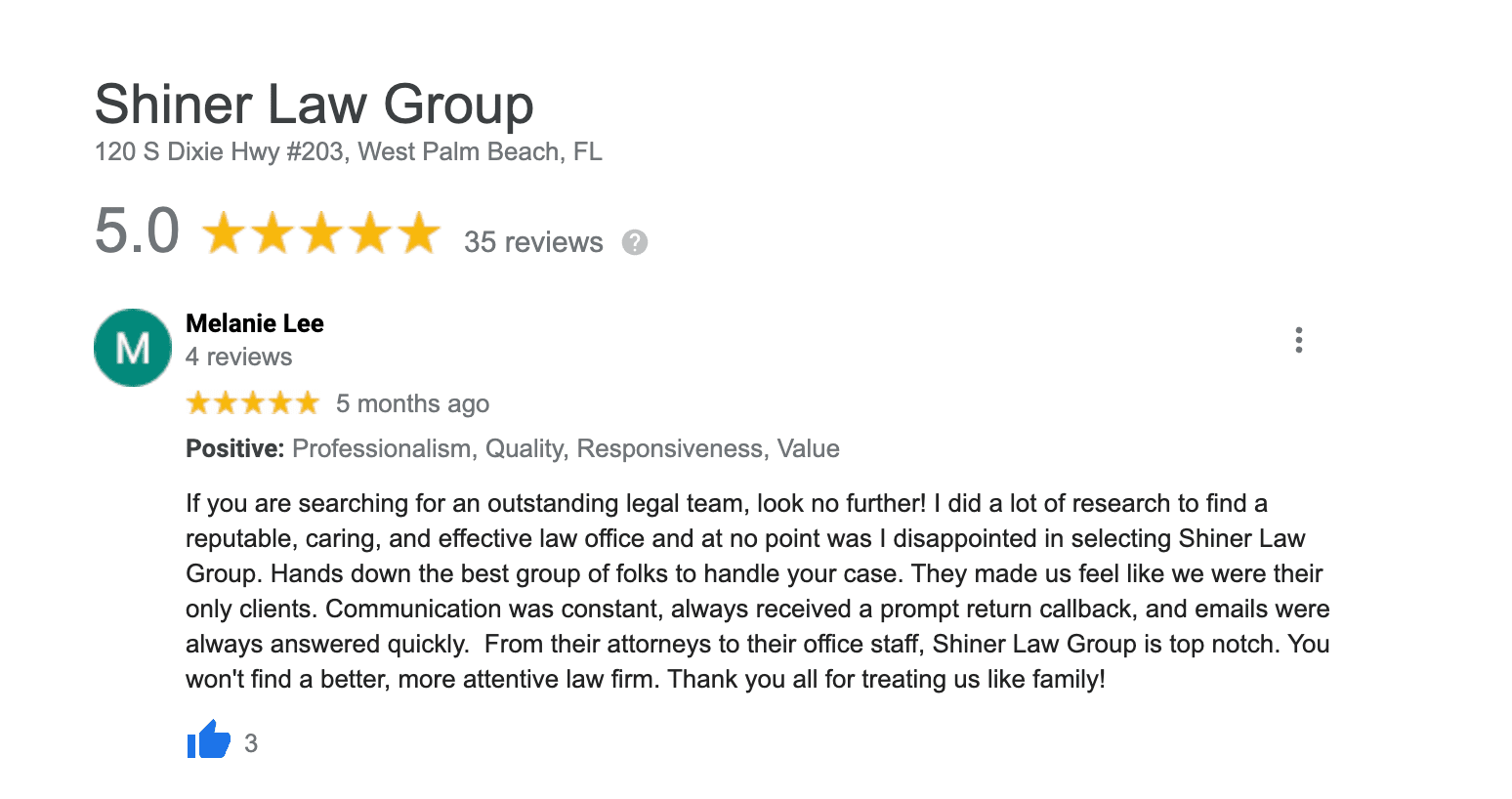 Did you suffer a traumatic brain injury as a result of an accident in West Palm Beach, FL? Our experienced West Palm Beach traumatic brain injury lawyers at Shiner Law Group are ready to help fight for your legal rights and get the compensation you deserve. Call us today at (561) 777-7700 to speak with an attorney for a 100% free consultation.
Did you suffer a traumatic brain injury as a result of an accident in West Palm Beach, FL? Our experienced West Palm Beach traumatic brain injury lawyers at Shiner Law Group are ready to help fight for your legal rights and get the compensation you deserve. Call us today at (561) 777-7700 to speak with an attorney for a 100% free consultation.
You may be entitled to seek compensation for medical bills, loss of income, pain, and suffering, and more. Contact our West Palm Beach, FL law offices to discuss the legal options that might be available to you following your traumatic brain injury accident. The next steps are very important. Let Shiner Law Group help you with your traumatic brain accident case today.
Did You Suffer A Traumatic Brain Injury In West Palm Beach?
In a tremendously popular tourist state, one of the most popular areas on the “must-see” list is West Palm Beach. However, despite the many entertaining features to be found here, there are also many opportunities for both residents and tourists to become injured. One of the most severe injuries an individual can experience is a traumatic brain injury.
If you have suffered a traumatic brain injury in West Palm Beach that someone else’s careless or reckless actions caused, you may seek compensation for the expenses and impacts of your injury through a personal injury lawsuit.
A West Palm Beach traumatic brain injury lawyer from Shiner Law Group can help you understand this legal process. With several office locations in the state, we have been fighting on behalf of injured individuals throughout Florida. Contact us for a free case evaluation to learn more about the services we can provide for you as you seek compensation for the extraordinary expenses and impacts often associated with this type of injury.
What Is a Traumatic Brain Injury?
The brain is one of the body’s most important and complex organs. It controls the body’s voluntary and involuntary responses and functions. Despite this tremendous task, the brain has only a limited ability to heal itself from damage. A traumatic brain injury damages the brain, usually by a sudden bump, blow, or jolt to the head or body.
Doctors categorize these injuries as either:
Closed head injuries – The damage occurred because of the impact of the brain against the skull without penetration of a foreign object; or
Open head injuries – An object has penetrated the skull and the brain, resulting in damage.
Common Causes of West Palm Beach Traumatic Brain Injuries
West Palm Beach is home to many features and attractions that place individuals at risk of suffering a traumatic brain injury.
Some common causes of TBI include:
- Falls, either from elevation or the same level. Whether you are shopping in one of the downtown boutiques, visiting the Norton Museum of Art, or attending a social gathering at a private residence, the owners of these properties have responsibilities. For instance, depending on the situation, they must attempt to promptly mitigate hazards that could cause guests to fall, and they must take action to warn guests of known hazards through the prominent placement of a warning sign.
- Motor vehicle accidents. Motor vehicle crashes injure more than 16,000 people in Palm Beach County each year, and more than 170 die.
- Violence. In West Palm Beach, an individual has about a 1 in 128 chance of becoming the victim of a violent crime such as an assault, which is higher than the average risk for individuals throughout Florida or those living in similarly sized cities across the nation. Violence is also one of the most common causes of traumatic brain injury.
- Recreational accidents, including accidents involving watercraft or contact sports, such as football or soccer, and activities like diving and surfing.

Common Deficits Caused by TBI
The brain contains several segments, known as lobes, which are responsible for controlling different body functions. The severity of the deficits experienced not only relies on the severity of the injury itself, but also on which part of the brain sustained the injury.
A look at the different lobes of the brain, the functions they control, and the deficits commonly associated in that area of the brain are as follows:
- Frontal lobe : Located in the front, forehead area of the skull, the frontal lobe controls such functions as attention, concentration, the ability to speak, awareness of abilities and limitations, emotions, planning, and judgment. A frontal lobe injury will often result in deficits such as an inability to control one’s emotions, impulses, and behavior, as well as difficulty recalling events or communicating with others through speech.
- Temporal lobes : Located in the temple, the temporal lobes control functions such as memory, the ability to understand spoken language, sequencing, hearing, and organization. An injury to this part of the brain will often result in difficulties with communication and memory.
- Parietal lobe : In the top, rear part of the skull, the parietal lobe’s functions include the sense of touch, spatial perception, and the identification of sizes, shapes, and colors. Damage to the parietal lobe can result in difficulties with the five primary senses of touch, taste, smell, sound, and sight.
- Occipital lobe : Located in the back of the skull, the primary function of the occipital lobe is to control vision. Injuries to this part of the brain can result in blindness or difficulty perceiving the size and shape of objects.
- Cerebellum : The cerebellum, located at the bottom of the brain, near the brainstem, is responsible for functions such as balance and coordination. An injury to this part of the brain often results in deficiencies in the ability to balance or move in a coordinated manner.
- Brainstem : The brainstem, located at the base of the skull, controls the body’s involuntary responses, such as heart rate, breathing, and the sleep/wake cycle. Injuries to this part of the brain often result in death as the body cannot survive independently without proper involuntary responses.
Complications Associated With TBI’s
In addition to the often-permanent deficits created by a traumatic brain injury, this type of injury also carries a high risk of severe complications, such as:
- Hydrocephalus, which is a buildup of cerebrospinal fluid in the brain following an injury. This excess fluid can cause a dangerous increase in pressure that can result in further damage if left untreated. The surgical placement of a shunt can drain the excess fluid away from the brain and into other parts of the body.
- Seizures, which commonly occur in the initial hours or days after the injury occurs, but can also recur months or even years after the injury. Recurring seizures after incurring a TBI are called post-traumatic epilepsy.
- Infections, which are most likely after incurring penetrating wounds that allow the introduction of bacteria into the protective covering around the brain. Infections are also common after suffering a TBI if the patient is immobile for any length of time or can’t communicate discomfort that would indicate the presence of an infection. Urinary tract infections, for example, are particularly common in infirm individuals.
- Blood vessel damage, which typically occurs simultaneously with the injury to the brain and can increase an individual’s risk of potentially fatal conditions such as a stroke or a blood clot. Blood clots are also a hazard of immobility, often occurring in the deep veins of the legs in an individual who is not moving around much or who has recently had surgery. This type of clot, known as deep vein thrombosis, can lead to another potentially fatal condition known as a pulmonary embolism, which occurs when part of a blood clot in the body breaks free and travels to the lungs.
- Chronic headaches are also a common complication of TBI, even among those who suffered a concussion, which is often called a “mild” form of traumatic brain injury. Concussions can also lead to permanent memory loss, sleep disturbances, depression, and other issues. This cascade of problems arising after a concussion is known as post-concussion syndrome.
- Altered consciousness, which may last days, weeks, or even months after the injury and can ultimately lead to death. Some better-known consciousness disorders that individuals experience after a traumatic brain injury include coma, persistent vegetative state, minimally conscious state, and even brain death, which is an irreversible condition in which there is no measurable brain activity.
- Degenerative brain diseases, such as Alzheimer’s, Parkinson’s, or dementia pugilistica.
A Traumatic Brain Injury Can Impact Every Part of Your Life
The lifetime cost of medical treatment alone for a brain-injured person can range from $85,000 to $3 million. However, for the approximately 5.3 million people currently living with a TBI in the U.S., the costs of the injury involve every aspect of life. A recent study indicates that more than half of the nation’s homeless population suffers from traumatic brain injuries. While many of these injuries result from the rough and often violent conditions that a homeless person deals with, for others, the injury and its impacts caused homelessness.
Some of the impacts of a TBI include:
- The inability to work or to earn in the same capacity as one did before the accident. The unemployment rate for brain-injured adults two years after the injury occurred is about 60 percent—far above the unemployment rate of non-injured adults. For those who return to work after the injury, accommodations are generally required, such as shorter work hours, fewer workdays, and more opportunities for the injured person to take breaks and rest his or her brain.
- Difficulty keeping up with the expenses associated with the injury, particularly if the injured individual can no longer work at the job through which he or she obtained health insurance.
- Dramatic changes to relationships. After an individual has suffered a traumatic brain injury, his or her family members often find that their relationships with the individual have changed, with parents, spouses, or even children of the brain-injured person taking on more of a caretaking role. Spouses often suffer a loss of consortium, which refers to the loss of physical intimacy and companionship because of serious injuries. The injury may also change friendships are also altered after the injury, with many individuals finding that the friends who lined the hallway outside their hospital room start to fade away—they may find themselves with little in common after the injury.
- Difficulty participating in society. It is not uncommon for a brain-injured person to experience mobility disabilities and difficulty controlling behavior and emotions. These issues make it hard for the injured person to enjoy community events or fully participate in the wide variety of social opportunities that West Palm Beach offers.
Seeking Compensation for Your West Palm Beach TBI
If you suffered a traumatic brain injury because of someone else’s careless or reckless behavior, you could seek compensation for the out-of-pocket costs of your injury as well as its impacts on your quality of life through a personal injury lawsuit. Florida allows personal injury claimants to seek the recovery of both economic and non-economic damages. In the legal arena, damage pays for harm.
Economic damages could provide for the expenses of your injury, such as:
- Medical expenses, including the cost of emergency treatment, ambulance transport, diagnostic imaging tests, hospitalization, physician and surgical services, prescription medication, physical therapy and rehabilitation, and the provision of assistive devices such as a wheelchair and necessary modifications to your home or vehicle to accommodate the injury.
- Wage loss resulting from being too injured to work or missing work to attend an injury-related medical appointment.
- Loss of future earning capacity.
- Property damage you incurred in the accident, such as the cost to replace or repair a car or motorcycle that you were operating when the accident occurred.
Non-economic damages refer to compensation for the ways your injury has impacted your quality of life.
Impacts that damage claims in cases involving a traumatic brain injury include:
- Physical pain and suffering.
- Emotional distress.
- Loss of the enjoyment of life.
- Loss of consortium.
- Permanent disability.
Read on for answers to some of the questions our West Palm Beach clients ask most often about recovering damages after suffering a traumatic brain injury.

Frequently Asked Questions for Our Traumatic Brain Injury Lawyers
The process of seeking compensation after an accident that resulted in serious injuries is often overwhelming for individuals who are not trained in the legal process. Here are some answers to the questions we are asked most often about pursuing compensation for a brain injury. For answers to questions about your specific case, contact us at Shiner Law Group for a free case evaluation.
How do I prove that someone else was liable for my TBI?
In brain injury cases, plaintiffs establish liability by showing:
- The at-fault party owed you a duty of care. The duty of care refers to the actions that a reasonable person would take to avoid causing injury to someone else in a specific set of circumstances.
- There was a breach in the duty of care. The breach refers to the actions that the at-fault party took that violated the duty of care.
- The breach in the duty of care resulted in an accident in which you incurred a traumatic brain injury. Because of this injury, you also incurred expenses and psychological impacts.
An attorney can help prepare a legal strategy to establish these factors. Contact a personal injury attorney, like those at Shiner Law Group, to get started.
What happens if my injury is not as severe as my doctor believed? Do I need to return some of my compensation?
In Florida, damage claims are made based on “a reasonable degree of medical probability.” What this means is that the particular presentation of your injury is likely to require further treatments. Based on the current cost of those treatments, compensation should account for the likelihood of the expense. If, however, you beat the odds and do not need to incur those future costs, it is not likely that you must repay your damage claim.
My brain injury was the result of violence and the at-fault party was arrested. Can I obtain compensation?
Violent acts such as assault, domestic violence, child abuse, or even assault with a deadly weapon such as a gun are among the most common causes of brain injury in the U.S.
The criminal process of government agencies arresting, investigating, and convicting individuals who are accused of wrongdoing is completely separate from the ability of the suspect’s victims to recover compensation through the civil process of a personal injury lawsuit. What this means is that, even though both legal actions involve the same set of circumstances, you could file your claim with the at-fault party’s insurance provider while the at-fault party is incarcerated or while he or she is on trial in the criminal matter.
Most violent criminals, however, don’t carry insurance that will cover their victims. In this case, our lawyers may look for other sources of liability—such as a bar, restaurant, hotel, store, or another establishment that failed to provide adequate security.
The impacts of the injury are the worst part for me. Can I pursue compensation for those effects?
A traumatic brain injury can affect every part of a person’s daily life, including the relationships he or she has with family and friends, as well as his or her ability to work or live independently after the injury. While these impacts are often severe, they are not as easily measurable by a price tag, like medical expenses. However, victims of TBIs may pursue non-economic damages to compensate them for the negative effects they suffered as a direct result of their injuries. Speak with your attorney about which non-economic damages you should pursue in your case and for how much.
I was partially at fault for the accident that caused my brain injury. Does this mean I cannot file a lawsuit?
Generally, in Florida, you can be partially responsible for the accident that caused your injuries and still seek compensation from other at-fault parties.
Do I need to pay taxes on the money I received as a settlement for my brain injury case?
For the most part, no. According to the Internal Revenue Service (IRS), compensation for personal injuries is not income and not taxable.
However, there are some exceptions, including:
- Punitive damages. Punitive damages are not based on the expenses and impacts of your injury, they punish a defendant for particularly egregious behavior. Because these damages are not related to your injury, you would be responsible for paying taxes on any punitive portion of your award.
- Medical expense deductions. If you claimed your medical expenses from the accident on your taxes and later received compensation for them, you must repay the amount that you deducted.
My adult child suffered a brain injury and can’t file a lawsuit. Can I file one for them?
When an individual is incapacitated and cannot seek compensation for their injury, another person is permitted to file the claim on his or her behalf. Normally, this would be a court-appointed legal guardian. However, a legal guardian was not appointed, a next friend or guardian ad litem acting in the best interests of the injured individual can file the claim. Be sure to let our attorneys know if this is the situation during your free case evaluation so we know how to proceed.
My spouse died as the result of a brain injury caused by someone else’s carelessness. Is there compensation available for me?
There is a process by which you could seek compensation for the expenses and impacts you have incurred because of your spouse’s death. This is called a wrongful death lawsuit. Like a personal injury claim, a wrongful death lawsuit is a legal claim filed in civil court. A personal representative of the estate must file the lawsuit on behalf of the deceased’s survivors.
Survivors who could benefit from this action include:
- The deceased’s spouse, children, or parents.
- Other blood or adoptive relatives who relied on the deceased for support.
The statute of limitations for wrongful death claims in West Palm Beach is generally two years after the date on which the death occurred.
The damages that you could seek through a wrongful death lawsuit include:
- The loss of support and services that the deceased provided to his or her family members.
- The loss of the deceased person’s companionship or protection.
- Mental pain and suffering incurred by family members because of the loss.
- The deceased’s children’s loss of parental guidance, instruction, and companionship.
- Medical and funeral expenses paid either by a family member or by the estate.
- Losses incurred by the estate, such as wages, benefits, and other earnings from the time in which the injury was sustained until the time of death.
- The value of benefits and earnings the deceased would have reasonably been expected to make through the remainder of his or her career if death had not occurred.
I cannot afford an attorney, but I am overwhelmed by the expenses of my TBI. What should I do?
The legal team at Shiner Law Group understands that many people are hesitant about seeking legal assistance because they fear the cost. What if you could obtain answers to your initial questions and get an attorney to begin working on your case without any initial investment from you?
We ensure that anyone who needs the benefit of our assistance has access by offering:
- A free case evaluation. You are not obligated to work with us, but please come talk to us about your case so we can help you understand the process involved in obtaining compensation.
- A contingent-fee payment scheme that allows you to wait to pay for your lawyer’s legal services until there has been a positive outcome to your case.
Wouldn’t it be easier to just file my case without an attorney? The insurance company will work with me, won’t they?
The legal process of pursuing compensation for injuries is a complex one that personal injury attorneys spend years becoming educated and trained in so that they can assist their clients. The process is filled with statutory requirements and formalities that those who wish to represent themselves must understand when they file their claim. The insurance company will focus on limiting or entirely avoiding a payout on your claim, not working to help you understand the process, or ensuring you get the amount of compensation you deserve.
In other words: it will be harder to file your claim without an attorney.
To protect your right to seek damages after an injury and ensure that you receive fair compensation for the major expenses and impacts that generally accompany traumatic brain injuries, your attorney can:
- Establish a valuation for your case that is based on the expenses and impacts you have already experienced because of your TBI as well as those you will likely incur.
- Identify all sources of liability and all insurance resources to compensate you. Insurance pays the vast majority of personal injury claims. While it is possible to sue an uninsured individual and even receive a judgment in your favor, it would likely be very difficult to collect your award. Additionally, because insurance policies have limits, you must find all sources of liability to recover enough compensation to cover your expenses.
- Negotiate with the at-fault party’s insurance provider. These negotiations generally begin when your attorney submits a demand package to the insurance provider, detailing the circumstances of the claim and the amount that you are seeking to recover in compensation. The insurance provider can either reject the claim outright; approve the claim as submitted; or submit a settlement offer. The latter is a popular choice, and negotiations will continue until you decide to accept an offer, or until a court renders judgment.
- Timely file your court-required paperwork in the proper jurisdiction and attend all pre-trial conferences and hearings. At some point, you and your attorney may determine that negotiations are not leading to a fair settlement offer and file a lawsuit. However, negotiations can continue after you file the claim in court.
- Collect and organize evidence and witness testimony to prove your claim.
- Guide you through the pros and cons of accepting or rejecting a settlement offer.
- In lieu of a settlement agreement, litigate. During litigation, your attorney can provide services such as delivering opening and closing arguments, examining witnesses, and presenting evidence.
- Collect your settlement or award.
- Represent you if the defendant in your case appeals a decision
For answers to your legal questions and to explore your legal remedies, get a free consultation from a traumatic brain injury lawyer from Shiner Law Group by contacting us online or calling (561) 777-7700.
West Palm Beach Traumatic Brain Injury Lawyer Review

West Palm Beach Traumatic Brain Injury Law Office
Shiner Law Group
1601 Belvedere Rd E-300 #21
West Palm Beach, FL 33406
